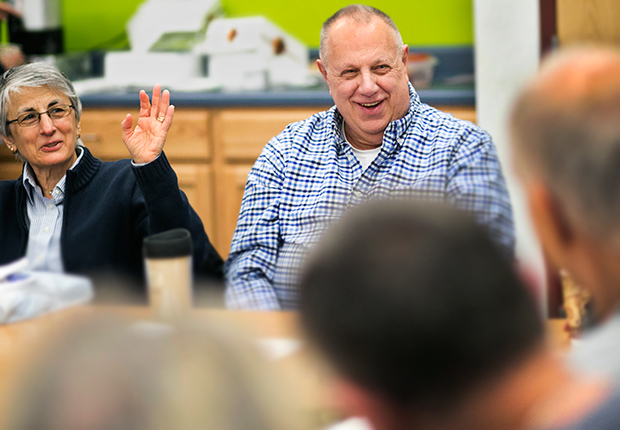AARP Hearing Center

By Hilary Appelman
Terry Hudon hid the fact he was gay when he served in the Navy, and he understands the isolation that can bring.
So Hudon knows how much his visits mean to a gay, disabled veteran at the VA hospital in Aspinwall, just outside Pittsburgh. Hudon, 70, said he believes his visits are the only time the veteran speaks to another gay person.
“He just lights up when he sees us,” Hudon said, after a visit with a friend. “It’s amazing.”
Hudon volunteers for the Friendly Visitor program run by Pittsburgh’s Persad Center, which serves the LGBT community in western Pennsylvania. The program focuses on LGBT adults who are isolated in their communities.
AARP Pennsylvania partners with Persad and other organizations across the state, as well as SAGE, a national organization for older LGBT adults, to address challenges facing LGBT individuals as they age. Issues include social isolation, health care and housing discrimination.
“We recognize that the 50-plus population reflects a diverse, multicultural community, and we want to reach out to that community,” said Angela Foreshaw-Rouse, AARP Pennsylvania manager for community outreach.
Foreshaw-Rouse said there is a “pressing need” for community and service organizations to be more sensitive to the issues LGBT people face.
AARP works with local advocates to help senior centers and agencies better identify and meet the needs of individuals, such as ensuring that same-sex couples are treated with respect.
That work is having “a huge impact,” said Chris Bartlett, executive director of Philadelphia’s William Way LGBT Community Center, one of AARP’s partners. “We’ve reached a tipping point in awareness.”
AARP also takes part in events such as Pittsburgh’s PrideFest, Allentown’s Pride in the Park and Philadelphia’s OutFest, and recently began cosponsoring Persad’s weekly Coffee & Conversation gatherings.
In November, AARP Pennsylvania hosted a roundtable discussion at the William Way Center about challenges the LGBT community faces. Jason Collins, the first openly gay man to play in the NBA, gave a keynote speech.
Speaking out about bias
Boomers are the first LGBT generation to be open about their sexual identities, Bartlett said. LGBT adults “expect to be treated as well as anyone else, and when they’re not they’re letting us know,” he said. As a result, the need for LGBT-friendly services will only grow.
Later this year, AARP Pennsylvania, the state Department of Aging and other agencies plan to hold a conference in Harrisburg to discuss long-term strategies for serving the older LGBT population.
Kathi Boyle, Persad’s coordinator of services for older adults, said some LGBT people face isolation in senior housing. “That’s very painful if you can’t talk to people who understand your life experiences,” she said.
Boyle, 71, has a friend in her 80s who went back to hiding her sexual orientation when she moved into a new complex.
“She doesn’t want to put up with people gossiping and bullying and ridiculing,” she said. “She can’t talk about her partner that she lost.”
One model for reducing social isolation is the LGBT-friendly John C. Anderson Apartments in Philadelphia, which opened in 2014. The complex has a waiting list of more than 200 people for its 56 units.
Elizabeth Coffey Williams, 70, a retired fiber artist and transgender film actress, said such housing “makes all the difference in the world.”
Hilary Appelman is a writer living in State College, Pa.































































